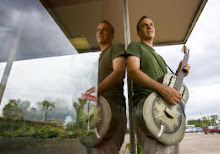John Egan excels as genre-busting musician
By ANDREW DANSBY Copyright 2009 Houston Chronicle
June 5, 2009
When John Egan shouts the blues, he’s hard to miss. Still, it can be difficult to find physical evidence the musician exists: He performs only about once a month, his three CDs are tough to find, and his most recent recording was for a buzzy movie that never had a real theatrical run.
The soft-spoken Egan seems fundamentally disinterested in engaging with the music business. He’s at his most comfortable going about his days quietly while cutting loose on stage, pounding his foot on a percussive stompbox and being just as combative with his steel resonator guitar.
“He’s got a way, especially when he plugs in that resonator, of really coming almost completely unhinged,” says David Rice, an Austin musician who has worked with Egan for more than 15 years. Most recently they collaborated on the score for the documentary film Crawford, about the Texas town that became home to President George W. Bush.
Egan has made three records that don’t lend themselves to easy categorization. He fits somewhere on an power blues arc that includes Jimi Hendrix and Chris Whitley, artists who put a powder keg under the venerable genre. He cops to taking in a lot of Prince as a young listener, which explains the funkier moments on his first album, The Gin Diaries. Houston’s rich singer-songwriter history seems to have also found its way into his mix.
As he puts it, “it’s kind of a hybridized thing. It was originally songwriter based, but it evolved into something louder.”
He’s also well acquainted with old Southern soul — evident in his singing — from his mother’s music collection. He says an early record by soul-singer-turned-disco-smoothie Johnnie Taylor made an early impression.
“It’s really impossible to put a finger on John’s style,” Rice says. “On first listen you may hear a grittiness and edginess, but underneath there’s a sensitive singer-songwriter thing as well. It gives it character.”
Egan, who turns 44 next week, was born in Hartford, Conn., but his family moved to Houston when he was 5. His father, also John Egan, ended his playing career in the NBA with the Houston Rockets and then coached the team for four seasons in the 1970s.
At 12, Egan got his first guitar and taught himself to play. “I ended up tuning it weird before I really knew what I was doing,” he says. He graduated from Memorial High School and attended the University of St. Thomas where he “wasted a few years being the guy in the dorm learning to play songs right.” Ultimately he found his way back to the unorthodox style of playing he had when he was younger. “I gravitated toward what my ear heard, and that was more drone-y and weird.”
The blues bug bit in the early 1990s. Egan says the 1990 release of Robert Johnson’s The Complete Recordings and Whitley’s debut album, Living With the Law, a year later “made my ears go up” and sent him digging deep into the blues.
Egan shares with Whitley a sometimes-studied, sometimes-stormy way with the resonator. And like that late blues player he seems uninterested in the business side. His albums can require a hunt or a visit to one of his shows (he performs at Under the Volcano on Wednesday). He says of Whitley, who died in Houston in 2005 broke and without a home, “he seemed like one of the few guys making music for the right reason but it required more than what a normal person would put himself through. The level of artistry was high, but the life quality suffers beyond what you can comprehend.”
Egan says he lost that sort of hunger for making music about a year ago. He went from being obsessive — writing and performing every day — to “hitting a wall. I got to a point where didn’t remember why I was doing it.”
He disappeared from stages and says he barely played and wrote music. “I think I just needed to re-energize,” Egan says. He wrote a group of songs that he began to think of as feeding a screenplay. “I think that’s what got me off track,” he says. “That notion of ‘Why am I doing this?’ I was getting away from being a guy who just plays and comes up with stuff.”
Concerts’ improvisational nature, he says, recently got him interested again. He’s been writing and offers the faint promise of a new recording.
Though he wrote and recorded several pieces for Crawford, the film was screened only at some festivals.
Rice, the film’s music supervisor, says the director originally wanted songs by Ryan Adams, Johnny Cash and Beck, but licensing them proved a headache. He pointed the director to Egan’s MySpace page, and two weeks later Egan was on his way to Austin to write and perform several instrumentals and update He’s a Mighty Good Leader, a classic associated with blues legend Skip James.
A DVD is forthcoming, but the film, like all of Egan’s most recent work, is available only on Hulu and iTunes.
Egan sounds disappointed that Crawford wasn’t more visible, and mentions any interaction with the music and film business makes him uneasy. He suggests it nudged him to “refocus to do something little that hopefully will resonate with somebody. Just to create some small thing.”




